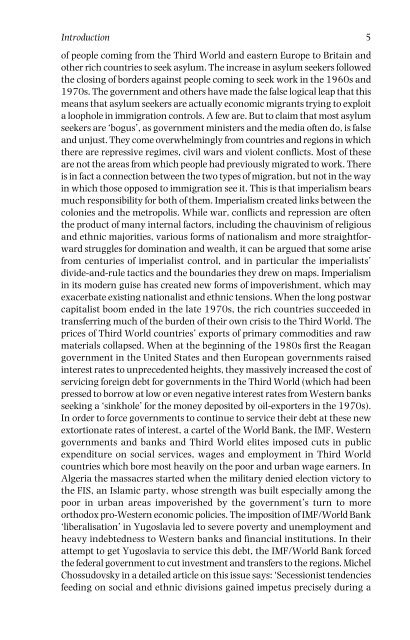Open%20borders%20The%20case%20against%20immigration%20controls%20-%20Teresa%20Hayter
Open%20borders%20The%20case%20against%20immigration%20controls%20-%20Teresa%20Hayter
Open%20borders%20The%20case%20against%20immigration%20controls%20-%20Teresa%20Hayter
You also want an ePaper? Increase the reach of your titles
YUMPU automatically turns print PDFs into web optimized ePapers that Google loves.
Introduction 5<br />
of people coming from the Third World and eastern Europe to Britain and<br />
other rich countries to seek asylum. The increase in asylum seekers followed<br />
the closing of borders against people coming to seek work in the 1960s and<br />
1970s. The government and others have made the false logical leap that this<br />
means that asylum seekers are actually economic migrants trying to exploit<br />
a loophole in immigration controls. A few are. But to claim that most asylum<br />
seekers are ‘bogus’, as government ministers and the media often do, is false<br />
and unjust. They come overwhelmingly from countries and regions in which<br />
there are repressive regimes, civil wars and violent conflicts. Most of these<br />
are not the areas from which people had previously migrated to work. There<br />
is in fact a connection between the two types of migration, but not in the way<br />
in which those opposed to immigration see it. This is that imperialism bears<br />
much responsibility for both of them. Imperialism created links between the<br />
colonies and the metropolis. While war, conflicts and repression are often<br />
the product of many internal factors, including the chauvinism of religious<br />
and ethnic majorities, various forms of nationalism and more straightforward<br />
struggles for domination and wealth, it can be argued that some arise<br />
from centuries of imperialist control, and in particular the imperialists’<br />
divide-and-rule tactics and the boundaries they drew on maps. Imperialism<br />
in its modern guise has created new forms of impoverishment, which may<br />
exacerbate existing nationalist and ethnic tensions. When the long postwar<br />
capitalist boom ended in the late 1970s, the rich countries succeeded in<br />
transferring much of the burden of their own crisis to the Third World. The<br />
prices of Third World countries’ exports of primary commodities and raw<br />
materials collapsed. When at the beginning of the 1980s first the Reagan<br />
government in the United States and then European governments raised<br />
interest rates to unprecedented heights, they massively increased the cost of<br />
servicing foreign debt for governments in the Third World (which had been<br />
pressed to borrow at low or even negative interest rates from Western banks<br />
seeking a ‘sinkhole’ for the money deposited by oil-exporters in the 1970s).<br />
In order to force governments to continue to service their debt at these new<br />
extortionate rates of interest, a cartel of the World Bank, the IMF, Western<br />
governments and banks and Third World elites imposed cuts in public<br />
expenditure on social services, wages and employment in Third World<br />
countries which bore most heavily on the poor and urban wage earners. In<br />
Algeria the massacres started when the military denied election victory to<br />
the FIS, an Islamic party, whose strength was built especially among the<br />
poor in urban areas impoverished by the government’s turn to more<br />
orthodox pro-Western economic policies. The imposition of IMF/World Bank<br />
‘liberalisation’ in Yugoslavia led to severe poverty and unemployment and<br />
heavy indebtedness to Western banks and financial institutions. In their<br />
attempt to get Yugoslavia to service this debt, the IMF/World Bank forced<br />
the federal government to cut investment and transfers to the regions. Michel<br />
Chossudovsky in a detailed article on this issue says: ‘Secessionist tendencies<br />
feeding on social and ethnic divisions gained impetus precisely during a


